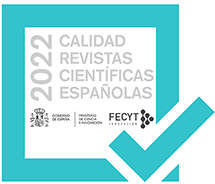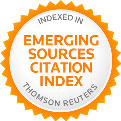Identificación con clubes y cultura futbolística en España. [Teams identification and football culture in Spain].
Resumen
Pese a la enorme relevancia del fútbol en la sociedad española, algunas de sus pautas y procesos característicos han sido poco examinados por la investigación sociológica. Este artículo presenta una investigación sobre la identificación con los principales clubes de fútbol en la sociedad española e incluye un análisis de los dos principales componentes de la cultura futbolística de sus aficionados, esto es, la vinculación y el compromiso personal con el club. El estudio se basa en una encuesta representativa de la población española realizada en 2007 por el Centro de Investigaciones Sociológicas (CIS) que contó con una muestra de 2.473 entrevistas. Los resultados obtenidos ponen de manifiesto la relevancia del fútbol como espacio de identificación; la posición hegemónica del Real Madrid y el FC Barcelona en la opinión pública española; la diversidad de elementos a partir de los cuales se constituye el posicionamiento de los principales clubes de fútbol españoles; y la relativa homogeneidad de los seguidores de los clubes en lo que se refiere a las pautas de compromiso y vinculación con sus clubes.
Abstract
Despite the enormous relevance of football in Spanish society, some of its patters and characteristic processes have been little analysed by the sociological research. This paper presents a research on the identifications with the main football clubs in the Spanish society and it includes an analysis on the two main components of the fans football culture, that is, the attachment and the personal commitment with the club. The study is based on a representative survey of the Spanish population carried out in 2007 by The Centre of Sociological Research (CIS) which had a sample of 2,473 interviews. The results show the relevance of football in Spanish society as a space of identification; the hegemonic position of Real Madrid and FC Barcelona in the Spanish public opinion, the diversity of elements which make up the positioning of the main clubs and the relatively homogeneity of the fans of the clubs in what is referred to commitment and attachment with their clubs.
http://dx.doi.org/10.5232/ricyde2013.03303
---------------------------------------------------------------------
Referencias/references
Durán, J. (1996). El vandalismo en el fútbol. Madrid: Gymnos.
PMCid:452188
Durán, J., y Jiménez, P. J. (2006). Fútbol y Racismo: un problema científico y Social. RICYDE. Revista Internacional de Ciencias del Deporte, 2(3), pp. 68-94.
http://dx.doi.org/10.5232/ricyde2006.00305
Durán, J., y Pardo, R. (2008). Racismo en el fútbol español (1ª y 2ª división); Temporadas 2004/05 y 2005/06. RICYDE. Revista Internacional de Ciencias del Deporte, 12 (4), pp. 85-100. http://dx.doi.org/10.5232/ricyde2008.01206
Fisher, R. J., & Wakefield, K. (1998). Factors leading to group identification: a field study of winners and losers. Psychology and Marketing, 15, pp. 23-40
http://dx.doi.org/10.1002/(SICI)1520-6793(199801)15:1<23::AID-MAR3>3.0.CO;2-P
Giulianotti, R. (1999). Football. A Sociology of the global game. London: Polity Press.
PMCid:2363009
Gray, G. T., & Wert-Gray, S. (2012). Customer retention in sports organization marketing: examining the impact of team identification and satisfaction with team performance. International Journal of Consumer Studies, 36 (3), pp. 275-281.
http://dx.doi.org/10.1111/j.1470-6431.2011.00999.x
Llopis-Goig, R. (2009). Racism and Xenophobia in Spanish Football: facts, reactions and policies. Physical Culture and Sport: Studies and Research, Vol. XLVII, pp. 35-43
http://dx.doi.org/10.2478/v10141-009-0030-0
Spaaij, R., & Vi-as, C. (2005). Passions, Politics and Violence: A Socio-historical Analysis of Spanish Ultras. Soccer and Society, 6 (1), pp. 79-96
http://dx.doi.org/10.1080/1466097052000337034
Wakefield, K. (1995). The pervasive effects of social influence on sporting event attendance. Journal of Sport and Social Issues, 19, pp. 335-351.
http://dx.doi.org/10.1177/019372395019004002
--------------------------------------------------------------------
Palabras clave/key words
Texto completo/Full Text:
PDF------------------------ 0 -------------------------
RICYDE. Revista Internacional de Ciencias del Deporte
![]()

Publisher: Ramón Cantó Alcaraz
ISSN:1885-3137 - Periodicidad Trimestral / Quarterly

